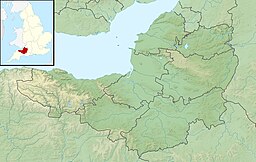| Blagdon Lake | |
|---|---|
 | |
| Location | Blagdon, Somerset |
| Coordinates | 51°20′06″N 2°41′51″W / 51.3350°N 2.6975°W |
| Type | reservoir |
| Primary inflows | River Yeo |
| Primary outflows | River Yeo |
| Catchment area | 2,144 ha (5,300 acres) |
| Basin countries | United Kingdom |
| Surface area | 440 acres (180 ha) |
| Average depth | 14 ft (4.3 m) |
| Max. depth | 42 ft (13 m) |
| Water volume | 8,456 million litres (6,855 acre⋅ft) |
Blagdon Lake lies in a valley at the northern edge of the Mendip Hills, close to the village of Blagdon and approximately 10 miles (16 km) south of Bristol, England. The lake was created by Bristol Water (Bristol Waterworks Company as it was known then), when it dammed the River Yeo, starting construction in 1898, to designs by Charles Hawksley, and completing this in 1905. The Wrington Vale Light Railway was constructed primarily to bring building materials for the lake.
The reservoir was formed by the construction of a dam and provided water to the pumping station which originally contained four Woolf compound rotative beam pumping engines, built by Glenfield & Kennedy of Kilmarnock, which have now been replaced by electric pumps. Two of the steam engines have been preserved, with one in working order as part of the visitor centre which also includes educational facilities for children. The pumping station is now a Grade II* listed building.
The 8,456,000,000-litre (1.860×109 imp gal; 2.234×109 US gal) lake still provides 9,547,000,000 L (2.100×109 imp gal; 2.522×109 US gal) of drinking water each year, but also acts as a fishing lake. It provides a habitat for a range of flora and fauna and is a Site of Special Scientific Interest. The original suction tanks, which formed the water supply for the steam boilers powering the pumping engines, are now used for trout rearing.
